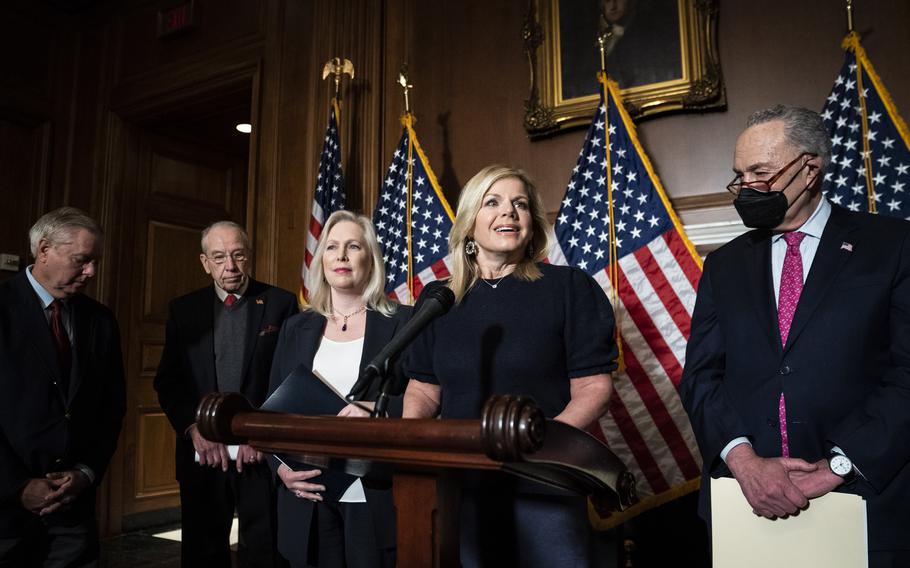
Sens. Lindsey Graham, R-S.C., left, Chuck Grassley, R-Iowa, and Kirsten Gillibrand, D-N.Y., former Fox News anchor Gretchen Carlson and Senate Majority Leader Chuck Schumer, D-N.Y., speak during a news conference to hail the passage of the Ending Forced Arbitration of Sexual Assault and Sexual Harassment Act on Capitol Hill on Thursday. (Jabin Botsford/Washington Post)
The Senate passed a bill Thursday that would end forced arbitration in workplace sexual assault and harassment cases, allowing survivors to file lawsuits in court against perpetrators.
The House passed the bill, the Ending Forced Arbitration of Sexual Assault and Sexual Harassment Act, on a 335-to-97 vote Monday. The Senate passed it on a voice vote Thursday morning. It now heads to President Joe Biden to be signed into law.
The bill would nullify agreements between employees and their employers in which the employees waive their rights to sue in the case of sexual assault or harassment. Instead, those agreements require the employees to settle their disputes with an arbitrator.
About 60 million Americans are subject to arbitration clauses, many of whom do not realize it because the provisions are buried in the fine print of their employment contracts, said Sen. Kirsten Gillibrand, D-N.Y., who first introduced the bill with Sen. Lindsey Graham, R-S.C., in 2017.
“This bill represents one of the most significant workplace reforms in American history,” Gillibrand said Thursday. “It will help us fix a broken system that protects perpetrators and corporations and end the days of silencing survivors. . . . The arbitration process not only allows the corporations to hide sexual harassment and assault cases in this secretive and often biased process, but it shields those who committed serious misconduct from the public eye.”
Senate Majority Leader Chuck Schumer, D-N.Y., called the bill “painfully overdue” and said that, for decades, mandatory arbitration “perpetuated cultures of abuse and unaccountability” in workplaces. He added that he had met with Graham and Sen. Joni Ernst, R-Iowa, in his office Wednesday to get the bill to the finish line and that he appreciated the bipartisan support.
“All of us have heard the searing testimonies of those who have faced harassment or abuse at work, only to discover their jobs offered precious little in accountability,” Schumer said Thursday. “We can’t ignore a basic reality of these clauses: They deprive victims of sexual harassment and assault of their basic rights by mandating they seek remedy only behind closed doors of private arbitration with no other alternative. This is wrong. It is unfair. And it’s about time it changed.”
Before the vote, Graham said he disagreed with arguments that the bill would be bad for business.
“It does not hurt business to make sure that people who are harassed in the workplace get treated fairly,” Graham said. “It’s better for business. So I just want to say, this just shows that we can function up here, that we’re listening to the world as it is.”
The #MeToo movement helped spur momentum and bipartisan support for the bill, after more victims spoke out about how they could not sue perpetrators because they had signed such clauses.
Former Fox News host Gretchen Carlson, who has been a key proponent of the bill, said she was shocked to learn that her employment contract included a forced arbitration clause. Her lawyers initially said the clause meant she could not sue then-Fox News CEO Roger Ailes, whom she accused of sexual harassment.
After the Senate vote Thursday, Carlson said she could never have imagined five years ago such a bipartisan victory. Back then, she noted, a friend had told her that “something good” would come out of her public accusations against Ailes.
“I didn’t really see it that way at the time, but it turns out she was right,” Carlson said at a news conference. “A lot of good will come from this bill, which is change. . . . It’s going to help companies get on the right side of history, that’s for sure. But it will also stop the bad behavior because now the bad actors will know that women’s voices will be heard when they speak up about what’s really happening at work.”
Carlson also noted that the bill did not apply to nondisclosure agreements that often prohibit sexual assault victims from speaking out against their perpetrators, and that she hoped Congress would examine that issue next.
“We wanted to get the first bite of the apple,” she said.
Rep. Cheri Bustos, D-Ill., who sponsored the legislation in the House, said she began working on the bill in 2017 after The Washington Post published a story “detailing the horrors thousands of workers were facing under forced arbitration clauses.”
“Sexual harassment, quid-pro-quo arrangements for sexual favors, abuse and even rape within a company were all being hidden behind closed doors because of a simple legal technicality in the employment paperwork,” Bustos said in a statement Thursday. “Since that start, we’ve seen the #MeToo movement expand, and with it, we’ve seen how pervasive and insidious forced arbitration clauses can be.”
In November, four sexual assault and harassment survivors testified before the House Judiciary Committee and described how being forced to go through the arbitration process only further traumatized them.
“To this day, whenever my career - my life’s work - is referenced, my accomplishments as an actor are ignored, and I’ve been reduced to being Eliza Dushku who was paid off for ‘allegedly’ being sexually harassed on a TV series,” Dushku, an actress and producer, said in her testimony. “As I hope you understand, this was not the outcome I desired or ever expected, but because of binding arbitration there will never be real justice for me and for countless other victims of sexual harassment.”
The Washington Post’s Mike DeBonis contributed to this report.